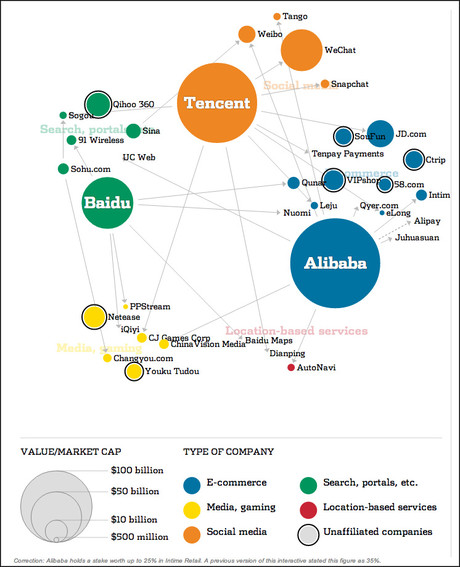
When Marc Lajoie was 11 years-old, a family friend gave him a C compiler, a program for translating and transforming the widely used computer language of C.
Armed with an innate ability for numbers and the natural curiosity of youth, Lajoie taught himself how to code throughout his teens and university years. A BSc in mathematics and physics from McGill University, Montreal, led to a career in neurology, creating systems to diagnose diseases and modelling their spread.
"I decided to go into journalism a year and a half ago," he told Journalism.co.uk, "before that it wasn't even on my radar.
"I've always loved writing and travelling and it occurred to me that journalism was a pretty good fit."
Now 35, he was recently named one of the Wall Street Journal's multimedia editors for Asia.
"I decided to go and do journalism and found a programme at the University of Bolton that was International Multimedia Journalism.
"It's given by the University of Bolton but it's actually in Beijing. I went to Beijing and did that, it was a one year MA and I just finished that a few months ago."Essentially what I'm working on is becoming the perfect post-print journalistMarc Lajoie, Wall Street Journal
The course naturally involved getting to grips with the tenets of photography and video, he said, but also elements of "cinematic journalism", learning to report, telling visual stories.
"Where my background really helped was in taking all this stuff and putting it online in a usable form, which was something my colleagues had a little trouble doing," he continued. "I could actually create a platform and put it up."
Nonetheless, the Wall Street Journal is a demanding and esteemed employer. After a few months back in Canada ("I couldn't even score an internship at some of the local papers") he decided to aim high.
"We are now seeking a high-calibre candidate to fill the following vacancy in Hong Kong," reads Lajoie from the public job advertisement. "The Wall Street Journal is looking for a newsroom programmer to research and develop multimedia projects for WSJ.com. The ideal candidate is a news hound with a love of visual storytelling backed by strong technical skills."
Alongside the traditional journalistic qualities of accuracy, integrity and other professional skills, the successful candidate, said the job listing, would have "high levels of proficiency in Photoshop, Illustrator, XML, HTML, CSS and JavaScript" as well as experience "developing web applications using JavaScript, particularly JQuery and Rafael". PHP, MySQL, Django and Python were "strongly preferred".
For some traditional journalists, a number of those programme names may be less than familiar, but the ability to mould the web to tell a story is becoming increasingly important in the newsroom.
"Essentially what I'm working on is becoming the perfect post-print journalist," Lajoie said, "that is what I want to do. I want to master all the skills that are useful in the post-print world.
"Good writing never goes out of style, all the photo and video elements are incredibly useful and then there's data journalism and coding."If I was going to learn any language starting now I would say learning Javascript is the oneMarc Lajoie, Wall Street Journal
The Journal's interview process had him carry out tasks that would be expected on a daily basis – testing his coding, storytelling and technical skills and pitching stories with a strong visual focus. A tense period of waiting and worrying later, he was offered the job.
Thrust straight into an important and challenging position, Lajoie has been getting to grips with the demands of the role since joining in March, but a recent interactive on China's three "Internet giants" showcases the skills for which there is an increasing desire.

Screenshot from WSJ.com of the interactive feature on China's "Internet giants"
Lajoie is an extreme example of someone who has spent most of his life independently developing coding skills, then making a career switch to journalism as those skills become more relevant.
But for everyone else, the gate isn't necessarily closed.
"I think you can become competent even if you don't become the best," he said. "Basic HTML, CSS, Javascript, basic web development stuff, and I think some web scraping stuff is definitely accessible."
Learning to code is like learning a language with all the relevant syntax and grammar that comes with it. A coder talks to a computer and tells it what to do. Sites like Codecademy run free courses in a range of languages but Lajoie said the real learning comes in problem-solving or the desire to build something, then finding the answers through trial and error or trawling the web for forums and answers.
Previously, different languages such as those listed in the advert for Lajoie's new job were better suited for different applications but JavaScript and NodeJS have changed the digital landscape, he said, allowing those who know the language to "do almost anything".
"If you want to learn to build web stuff then start with HTMl and CSS and then choose a programming language," he said. "I'd still start with HTMl, CSS and then Javascript and then I would extend my JavaScript knowledge using Node and things like that to start building some cool backend stuff. That's the progression I'd use.
"If I was going to learn any language starting now I would say learning Javascript is the one."
Update: This article has been updated to correct the formatting of Lajoie's surname and his job title.
Free daily newsletter
If you like our news and feature articles, you can sign up to receive our free daily (Mon-Fri) email newsletter (mobile friendly).
Related articles
- 200 speakers you need at your next journalism event to avoid all-male panels
- The Wall Street Journal launches archived content newsletter
- From problem solver to innovator: how bridge roles have evolved in newsrooms
- Robin Kwong, new formats editor of The Wall Street Journal, on evolving bridge roles
- 36 blogs by journalists, for journalists









